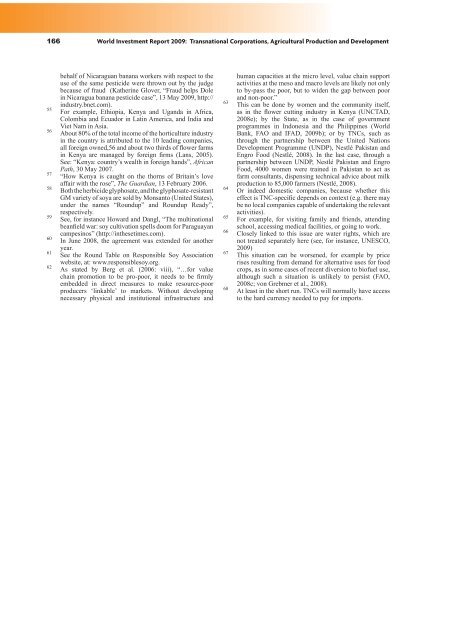World Investment Report 2009: Transnational Corporations - Unctad
World Investment Report 2009: Transnational Corporations - Unctad
World Investment Report 2009: Transnational Corporations - Unctad
You also want an ePaper? Increase the reach of your titles
YUMPU automatically turns print PDFs into web optimized ePapers that Google loves.
166 <strong>World</strong> <strong>Investment</strong> <strong>Report</strong> <strong>2009</strong>: <strong>Transnational</strong> <strong>Corporations</strong>, Agricultural Production and Development<br />
55<br />
behalf of Nicaraguan banana workers with respect to the<br />
use of the same pesticide were thrown out by the judge<br />
because of fraud (Katherine Glover, “Fraud helps Dole<br />
in Nicaragua banana pesticide case”, 13 May <strong>2009</strong>, http://<br />
industry.bnet.com).<br />
For example, Ethiopia, Kenya and Uganda in Africa,<br />
Colombia and Ecuador in Latin America, and India and<br />
Viet Nam in Asia.<br />
56 About 80% of the total income of the horticulture industry<br />
in the country is attributed to the 10 leading companies,<br />
���������������������������������������������������������<br />
��� ������ ���� �������� ��� �������� ����� ������� ��������<br />
See: “Kenya: country’s wealth in foreign hands”, African<br />
57<br />
Path, 30 May 2007.<br />
“How Kenya is caught on the thorns of Britain’s love<br />
affair with the rose”, The Guardian, 13 February 2006.<br />
58 Both the herbicide glyphosate, and the glyphosate-resistant<br />
GM variety of soya are sold by Monsanto (United States),<br />
under the names “Roundup” and Roundup Ready”,<br />
59<br />
60<br />
61<br />
respectively.<br />
See, for instance Howard and Dangl, “The multinational<br />
���������������������������������������������������������<br />
campesinos” (http://inthesetimes.com).<br />
In June 2008, the agreement was extended for another<br />
year.<br />
See the Round Table on Responsible Soy Association<br />
website, at: www.responsiblesoy.org.<br />
62 As stated by Berg et al. (2006: viii), “…for value<br />
������ ���������� ��� ��� ���������� ��� ������ ��� ��� ������<br />
embedded in direct measures to make resource-poor<br />
producers ‘linkable’ to markets. Without developing<br />
necessary physical and institutional infrastructure and<br />
63<br />
human capacities at the micro level, value chain support<br />
activities at the meso and macro levels are likely not only<br />
to by-pass the poor, but to widen the gap between poor<br />
and non-poor.”<br />
This can be done by women and the community itself,<br />
��� ��� ���� ������ �������� ��������� ��� ������ ���������<br />
2008e); by the State, as in the case of government<br />
programmes in Indonesia and the Philippines (<strong>World</strong><br />
Bank, FAO and IFAD, <strong>2009</strong>b); or by TNCs, such as<br />
through the partnership between the United Nations<br />
Development Programme (UNDP), Nestlé Pakistan and<br />
Engro Food (Nestlé, 2008). In the last case, through a<br />
partnership between UNDP, Nestlé Pakistan and Engro<br />
Food, 4000 women were trained in Pakistan to act as<br />
farm consultants, dispensing technical advice about milk<br />
production to 85,000 farmers (Nestlé, 2008).<br />
64 Or indeed domestic companies, because whether this<br />
���������������������������������������������������������<br />
be no local companies capable of undertaking the relevant<br />
65<br />
activities).<br />
For example, for visiting family and friends, attending<br />
school, accessing medical facilities, or going to work.<br />
66 Closely linked to this issue are water rights, which are<br />
not treated separately here (see, for instance, UNESCO,<br />
67<br />
<strong>2009</strong>)<br />
This situation can be worsened, for example by price<br />
rises resulting from demand for alternative uses for food<br />
crops, as in some cases of recent diversion to biofuel use,<br />
although such a situation is unlikely to persist (FAO,<br />
2008c; von Grebmer et al., 2008).<br />
68 At least in the short run. TNCs will normally have access<br />
to the hard currency needed to pay for imports.

















